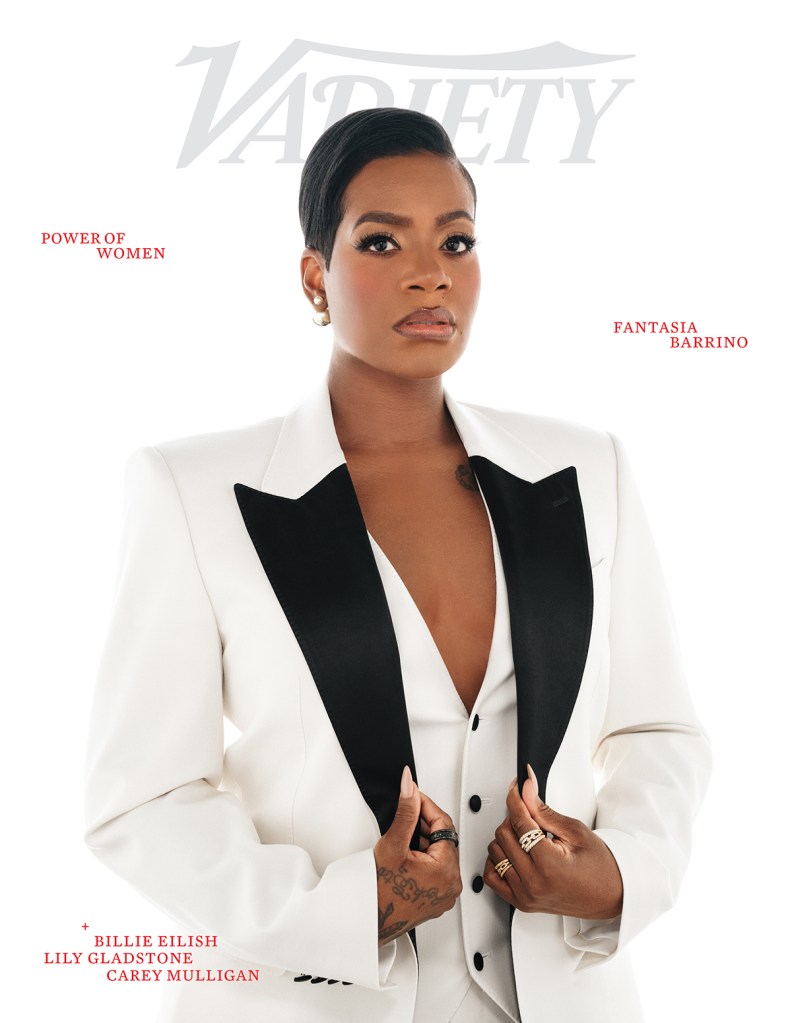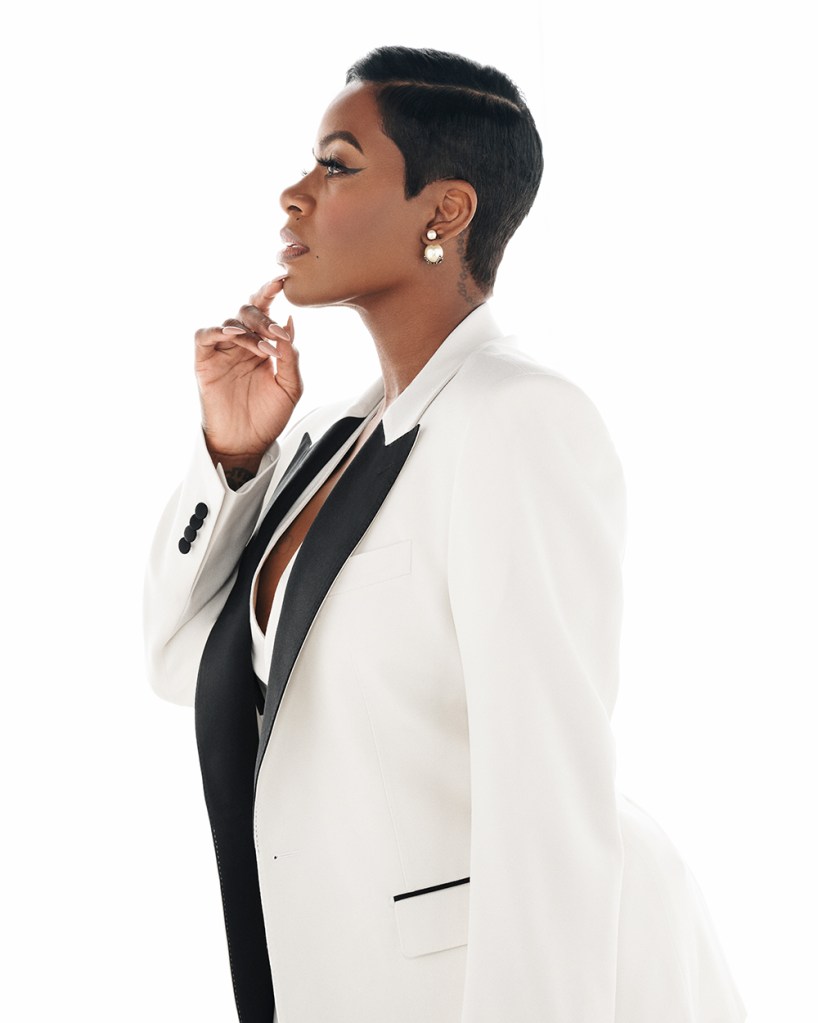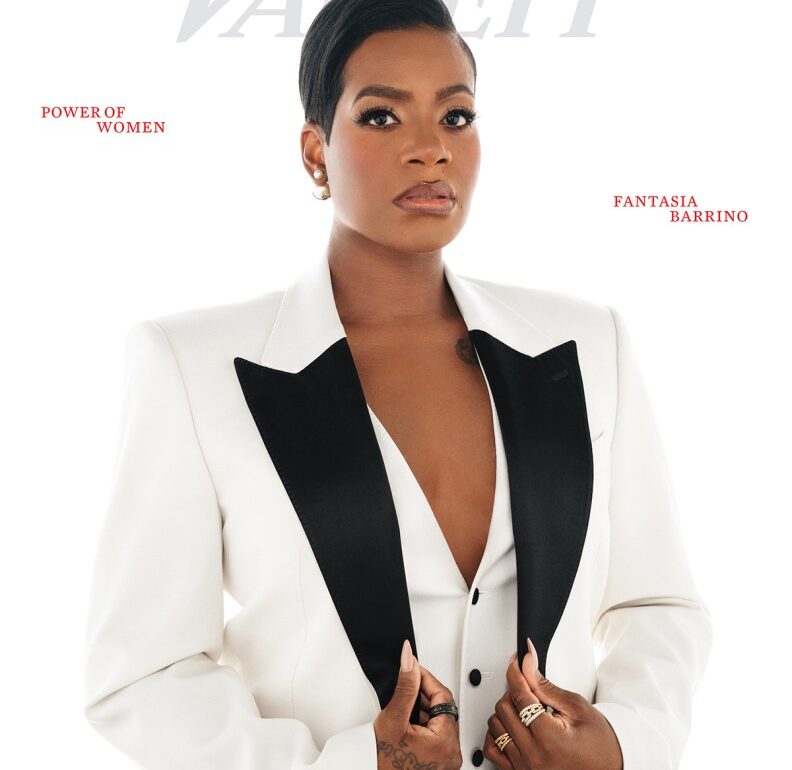It’s hard to turn down Oprah Winfrey.
But that’s exactly what Fantasia Barrino did when the original “Color Purple” star approached her in 2021 to play Celie, an abused and uneducated Southern Black woman at the turn of the 20th century, in a big-screen musical reimagining of the classic film and Alice Walker’s novel.
Sixteen years ago, when she was in her early 20s, Barrino had played the role on Broadway, but it had been a traumatic rather than triumphant experience. “My life was in shambles,” Barrino, now 39, says, explaining how draining it was to portray Celie’s harrowing journey for eight shows a week. “I carried her every day, all day, and I didn’t like that feeling.”
When her run ended nine months later, she swore she’d never play the role again.
It was director Blitz Bazawule who changed Barrino’s mind about doing the film. He flew to her North Carolina home to explain his spin on the story, sharing his vision of Celie’s first encounter with Shug Avery, played by Taraji P. Henson, the sultry songstress who opens Celie’s eyes to a world beyond her oppressed existence. In the scene, Shug asks Celie to crank the gramophone so she can listen to a record while soaking in a bathtub. Bazawule planned to have this encounter trigger Celie’s imagination, staging the action on a massive record player as the character sings her way through her awakening.
Barrino loved the idea. She realized that, in the movies, unlike onstage, the audience could have access to Celie’s inner monologue, giving the character, who rarely speaks, more of a voice. “You get to see how she made it through some of this stuff,” Barrino notes. So she said yes.

Barrino showed an intense commitment to the role, despite it bringing up a lot of unresolved feelings about her own experiences with violence and sexual abuse in past relationships. For instance, instead of letting a stunt double handle the scenes where Celie’s husband, Mister, hits her, Barrino insisted on taking the stage punches herself. Colman Domingo, who plays Mister, protested, but Barrino explained: It was an opportunity to face her past rather than run from it. “I could let go of every man that’s ever put his hands on me. I freed myself from that.”
But there was one scene that worried Barrino: the one where she performs “I’m Here,” the anthem a newly empowered Celie sings toward the end of the musical. Barrino had the prowess to pull off the song’s gravity-defying vocal range, but for a musician who sings from the depths of her soul, the emotional intensity of the lyrics made things more difficult. It all hit very close to home.
“I remember saying, ‘God, just stay with me, so that I won’t cheat Celie,’” she says. “Give me the strength to belt this song.”
“The Color Purple” marks Barrino’s first film role after playing herself in the 2006 Lifetime movie “Life Is Not a Fairy Tale: The Fantasia Barrino Story,” based on her memoir. So she didn’t have much experience with the grueling process of doing multiple takes for hours, each bar of each song sung dozens of times in the freezing night air. It was nearly dawn when Bazawule called cut.
“That moment where she looks at us and her voice breaks,” Bazawule says — referring to the song’s climactic line, “I’m beautiful and I’m here” — “it’s like, ‘That’s it. That’s her. Everybody pack it up and go home.’”
Returning to the role of Celie granted Barrino a deeper understanding not only of the character but also of herself. “I realized Celie was not ugly,” she says. “Celie was not crazy. Celie was not illiterate. Nothing about her was dumb. She was the piece to the whole puzzle that kept everybody together.”
Though bringing Celie to the screen was punishing, it was also liberating. “I’m grateful that I did not allow those voices in my head to hold me back from stepping into this woman’s shoes,” she says. “It was important that I did.”
It’s a warm fall day when Barrino breezes into the rooftop bar of her Los Angeles hotel, looking ready for battle in an army-green catsuit.
“I grew up watching fighters,” Barrino says after settling into a corner booth. She’s not talking about boxers or brawlers. She’s describing the women in her life, specifically her mother, Diane Barrino, and her late grandmother, Apostle Addie Collins. “I watched them fall and I watched them get back up,” she explains. “They never quit. A lot of that is embedded in me. It’s in my blood. It’s in my DNA.”
It’s been nearly 20 years since Barrino was crowned the “American Idol,” winning the third season of the singing competition in 2004 and becoming the first Black woman to claim the title. Suddenly she was a role model to a generation of Black girls who saw themselves in her. When she first appeared on the show, though, she was just Tasia, a 19-year-old single mom. “Didn’t know nothing about nothing, other than I loved to sing,” Barrino says. “I didn’t know all the things that came with it, the pros and the cons.”

But the past two decades have seen her rise to great heights. Barrino’s single, “I Believe,” made her the first artist to debut at No. 1 on the Billboard Hot 100; she authored a bestselling memoir, “Life Is Not a Fairytale”; and she’s earned 12 Grammy nominations, with one win. She’s also endured her share of troubles, including an overdose on aspirin and sleeping pills in 2010 that put her in the hospital, as well as in the tabloids.
Yet even as Barrino recounts her darkest moments, she has an effervescence about her. She sparkles, and it’s not just the diamonds on her watch or the ones that adorn the bottom row of her teeth or even her massive wedding ring set.
“I’m so HAPPY — in all caps — and I never thought I would have that,” Barrino says, referring to her relationship and wiggling her ring finger in the air.
Barrino’s art has always been her testimony, resounding with all the trials that she, I, you, and all our mamas have been through. She’s a soul singer and she’s also a “PK” — a preacher’s kid. Her grandmother led the church, with her mother as co-pastor, so when Barrino sings, she infuses the melody with her whole being, making it spiritual. And the way she speaks hints at many Sundays spent in a pew listening to ministers evangelize about heavenly rewards and earthly tribulations.
Who can forget seeing her tear into “Summertime,” the classic blues aria, on “American Idol”? “Oscar-winning performance,” Paula Abdul, one of the show’s judges, declared.
Barrino’s seen the clip recently. (She often watches her showstopping moments from “American Idol” on YouTube — especially if she’s had a glass of wine.) “Summertime” was pivotal because Barrino felt nobody was rooting for her at that point in the competition; she was getting criticized online for being a young unwed mom to a toddler.
“There was this bathroom on the second floor where I would go call my mom and we would pray,” Barrino recalls.
Barrino famously took off her shoes for the performance, shocking the “Idol” wardrobe department. “I needed to be grounded,” she says. She told the producers, “This is how I used to sing back home.”
She doesn’t really remember singing “Summertime,” she was so lost in it. “It was just me and God,” she says, tears welling up. “That moment changed everything. I just went out and showed them who I am — that there was still some good in me, flawed and all.”
The tears spill over, muddying her makeup. Barrino motions to the waiter as he walks past and asks for a napkin. “She made me cry,” she says with a laugh.
The night she won “American Idol,” Barrino ran into her grandmother’s arms. “Tasia, the chains have been broken tonight,” Collins told her. And quite literally everything had broken — one of her heels, her bracelet, her necklace — but her grandmother also delivered a warning. “Buckle up. Prepare yourself. Because with all of this comes the storm.”
And Barrino’s next decade had its share of tempests. In times of trouble, she turned to her faith. One day in 2008, just after ending her run as Celie in “The Color Purple,” she visited a church in Los Angeles where a guest speaker, Bishop George Bloomer, was preaching. From the pulpit, he “spoke a word into my life.”
Bloomer told Barrino she was about to grapple with 10 years of pain. “I’m just sitting there like, ‘Wait, but I’m a good person. Why am I going through this?’” she remembers thinking. And Bloomer continued his prophecy. “But if you hold on, and if you make it through, your ending is going to look way better than your beginning.” The interaction was filmed, and Barrino asks me to look it up: A minute and a half into the clip, she lets out a mournful wail that seems to never end.
Two years later, Barrino woke up in a North Carolina hospital with tubes down her throat after overdosing. She doesn’t use the word “suicide” when she describes the incident but says, “I just wanted the noise to stop.” It had become too much — supporting her family financially; battling her father in a lawsuit claiming her memoir portrayed him as a money-hungry parent; her house in foreclosure. She’d grown weary from carrying the weight.
In the hospital, as Barrino was recovering, a nurse confronted her with a stack of magazines that had her face plastered on their covers. “‘You see that young lady,” the nurse said. “She’s strong. She’s a blessing.” And then the nurse delivered a message: “Don’t you come back in here no more. You fight.”
Barrino never saw the woman again, but her words carried her forward. “I left that hospital and said, ‘I’ll never do that again, because I have purpose,’” she says. “I’m going to speak into every young person’s life and tell them, ‘Don’t you dare give up.’” Determination flashes in Barrino’s eyes. She has not, and will not, let circumstances harden her.
“I don’t care if it gets ugly again,” she adds, talking about her future. “I don’t care if there’s storms. I realized I have the spirit of an eagle,” she says, spreading her arms like wings. “They fly over storms.”
In 2015, Barrino’s world grew more hopeful with her marriage to Kendall Taylor, who Barrino describes as “my king, my best friend, my homie, my hitta.” Taylor, now a successful businessman, had a troubled young adulthood and was convicted on felony assault and weapons charges. “We fell in love with each other because we fell in love with our scars,” she says. “I fell in love with everything he went through and how he came out of it.”
Taylor was inspired to help other men avoid the dangerous path he went down. So in 2021, he founded Salute 1st, an initiative designed to foster leadership skills. Taylor piloted the six-month program in prisons and has since expanded it to include helping boys; two Louisiana schools have added the course to their curriculum.
Ever the proud wife — and wanting to amplify the cause — Barrino reaches into her purse, grabs her phone and scrolls through Instagram to find a video of the students. “These were kids that people had written off,” she says, beaming while playing a clip of Black teens suiting up in coats and ties. “Now these kids are standing up strong.”
Barrino knows how much a helping hand can change your circumstances because that’s what her “angels” — including the nurse in North Carolina and Bishop Bloomer — did for her.
“I did exactly what that man of God once told me to do I hung in there. We’ve got it in us. You just got to tap into it, baby. I tapped into it, and now I’m here!”
Then Barrino salutes me, following it up with a tight embrace, and she’s off — leaving an empty mimosa glass and a little bit of her sparkle behind.
Styling: Luca Falconi/Opus Beauty; Makeup: Timothy Clark; Hair: Derickus Crawford; Manicure: Temeka Jackson/A-Frame Agency; Look 1 (gold look): Dress, earring and bracelet: Dolce & Gabbana; Bracelets and rings: David Yurman; Look 2 (white suit): Suit: Dolce & Gabbana; Earrings: Christian Dior; Rings: David Yurman
This post was originally published on this site be sure to check out more of their content.









